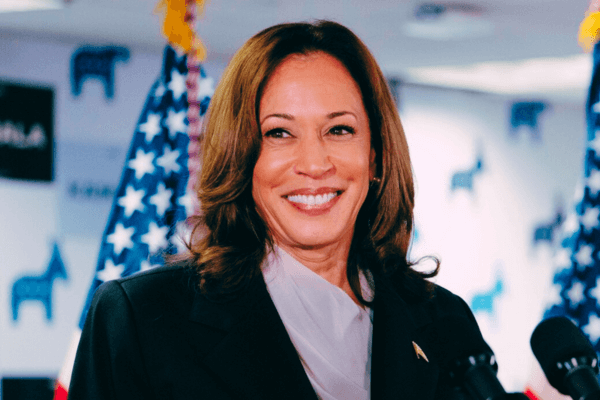If Kamala Harris, the Democratic nominee for U.S. president, were to take a decisive stance demanding that Israel agree to an immediate ceasefire and unimpeded aid to Palestinians, she'd expand her vote lead over her Republican opponent, Donald Trump.
This is one key finding of a recent poll commissioned by the **Arab American Institute** working with pollster **John Zogby**. Between the Republican and Democratic conventions, AAI surveyed 2,505 U.S. voters to assess how the war in Gaza and U.S. policy toward Israel's conduct of the war would impact their votes in November.
The poll found that 15% of all voters say the crisis in Gaza would be "very important" in determining their vote (another 33% say "somewhat important"). But like many issues in today's America, this exposes a deep partisan divide-with Republicans more supportive of Israel and Democrats favoring Palestinians.
A closer look at the data reveals that the partisan divide results from differences in the views of each party's base demographic groups-with younger and non-white voters more sympathetic toward Palestinians and critical of Israel, and older, white, and "born-again" Christians much more favorable toward Israel.

Most voters in all groups, except Republicans and "born-again" voters, disapprove of Israel's conduct in the war, feel Israel's used too much force in Gaza, want an immediate ceasefire, and oppose unrestricted financial and military support for Israel if it continues to operate in a manner that puts civilian lives at risk.
A plurality of all voters (43%) disapprove of how Israel is conducting the war (including 54% of Democrats and 52% of young voters), with only one-third approving. And 36% of likely voters feel Israel has used too much force, including 46% of 18-34-year-olds.
One area of near unanimity is the importance of an "immediate ceasefire." Three-quarters of voters say this is important to them-one-half say "very important" and another one-quarter say "somewhat important." Only 11% say it's "not important." This super-majority includes Democrats, Republicans, and Independents and majorities of every demographic sub-group. The most substantial majorities are among young and non-white voters. Only very small percentages in all groups say an immediate ceasefire is not important.
Another area of strong support from most voter sub-sets is whether Israel should continue to receive unrestricted U.S. aid or if it should be conditioned. Only 28% feel Israel should always receive unrestricted aid, while 51% say "no unrestricted aid if Israel endangers civilians." GOP voters are evenly split at 40%, while Democrats and Independents oppose unrestricted aid to Israel (D: 59% to 20%, I: 56% to 26%).
The Biden administration receives low marks for its handling of the war-31% positive and 50% negative-a negative view shared by voters in all parties and demographic groups. The poll reveals that this dissatisfaction provides an opportunity for Vice President Harris.
Asked how it would affect their vote if Harris were to demand that Israel agree to an immediate ceasefire and unimpeded human aid into Gaza, Harris voters overwhelmingly support such a move, while only a scant number oppose it.
A deeper look shows significant gain and very little risk for Harris by taking this stand, including very positive outcomes and few negatives among most key groups, including a plurality of Jewish voters. She'd also win the support of a plurality of traditionally Democratic voters who are currently supporting third-party candidates or remain undecided. Overall, if Harris were to take this stand, her vote tally would increase from 44% to 50%.
The same holds true if Harris were to support a suspension of arms shipments and withhold diplomatic support for Israel until there's a ceasefire and withdrawal of forces from Gaza. Her support would increase from 44% to 49%.
In early August, VP Harris held a slim lead against former President Trump in a head-to-head or multi-candidate contest. Our poll confirms this.
Given the American electorate's deep divisions, the presidential contest will likely remain close.
Harris can grow support by building on her already stated compassion for Palestinian suffering, call for an immediate ceasefire, and implied concern with Israel's actions in this war by making clear that there'll be consequences if the war continues-a step President Biden has been loath to take.